关于大脑的英文演讲
- 格式:ppt
- 大小:5.06 MB
- 文档页数:20

人体的大脑能做什么小作文英语高中The Human Brain: A Remarkable OrganThe human brain is a remarkable and complex organ that possesses an incredible array of capabilities. As the control center of the body, the brain is responsible for a wide range of functions, from regulating basicphysiological processes to enabling higher-order cognitive abilities.One of the primary functions of the brain is to process and interpret sensory information. The brain receives input from the five senses – sight, sound, touch, taste, and smell – and integrates this information to create a cohesive understanding of the external environment. This allows individuals to perceive and interact with the world around them.In addition to sensory processing, the brain also plays a crucial role in motor control. It coordinates the movement of the body's muscles, enabling individuals to perform a wide range of physical tasks, from simplemovements like walking to complex actions like playing a musical instrument.The brain's cognitive capabilities are perhaps its most remarkable feature. It is responsible for higher-order functions such as memory, learning, reasoning, problem-solving, and decision-making. The brain's ability to store and retrieve information, form new connections between ideas, and generate novel solutions to problems is what allows humans to engage in complex intellectual activities and adapt to changing environments.Moreover, the brain is the seat of our emotional experiences. It regulates our moods, feelings, and emotional responses, shaping our overall well-being and influencing our behavior and decision-making processes.The brain's remarkable versatility and adaptability are a result of its intricate structure and the complex interactions between its various components. The brain is composed of billions of neurons, each of which can form thousands of connections with other neurons, creating a vast and intricate network of communication pathways.Through this network, the brain is able to process information, store memories, and generate new ideas. The brain's plasticity, or its ability to change and adapt in response to experience, allows it to continuously learn and grow, enabling individuals to acquire new skills and knowledge throughout their lives.Despite our extensive understanding of the brain's functions, much about this remarkable organ remains a mystery. Ongoing research in fields such as neuroscience, psychology, and cognitive science continues to shed light on the brain's inner workings, revealing new insights into the nature of human cognition, emotion, and behavior.As we continue to explore the depths of the human brain, we can only marvel at its incredible capabilities and the profound impact it has on our lives. The brain is truly a testament to the wonders of the natural world and the incredible complexity of the human body.人体大脑的奇妙之处人类大脑是一个非常出色和复杂的器官,拥有令人难以置信的各种功能。
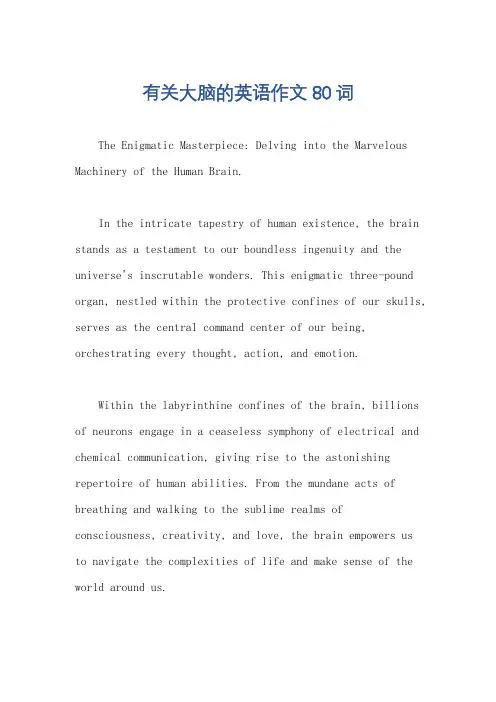
有关大脑的英语作文80词The Enigmatic Masterpiece: Delving into the Marvelous Machinery of the Human Brain.In the intricate tapestry of human existence, the brain stands as a testament to our boundless ingenuity and the universe's inscrutable wonders. This enigmatic three-pound organ, nestled within the protective confines of our skulls, serves as the central command center of our being, orchestrating every thought, action, and emotion.Within the labyrinthine confines of the brain, billions of neurons engage in a ceaseless symphony of electrical and chemical communication, giving rise to the astonishing repertoire of human abilities. From the mundane acts of breathing and walking to the sublime realms of consciousness, creativity, and love, the brain empowers usto navigate the complexities of life and make sense of the world around us.The brain's structural complexity is matched only byits remarkable plasticity. Throughout our lives, our experiences shape and reshape neural pathways, allowing us to learn, adapt, and grow. This remarkable capacity for change underpins our ability to overcome adversity, acquire new skills, and forge enduring memories.Unlocking the secrets of the brain has long been the holy grail of scientific inquiry. From the ancient Greeks' philosophical musings to the advent of modern neuroimaging techniques, humanity has relentlessly pursued a deeper understanding of this extraordinary organ.In recent decades, advances in neuroscience have illuminated the brain's intricate workings with unprecedented clarity. Functional magnetic resonance imaging (fMRI) has allowed us to visualize brain activityin real-time, revealing the neural correlates of everything from language processing to decision-making. Electroencephalography (EEG) has enabled us to monitor the brain's electrical oscillations, providing insights into cognitive processes such as attention, memory, and sleep.While these scientific breakthroughs have undoubtedly expanded our knowledge of the brain, much of its inner workings remain shrouded in mystery. The fundamental mechanisms underlying consciousness, free will, and creativity continue to elude our grasp. As we push the boundaries of neuroscience, we are confronted with the tantalizing prospect of unraveling these enduring enigmas.The brain's profound influence on our lives extends far beyond its role as a biological machine. It is the wellspring of our hopes, dreams, and aspirations. It shapes our perception of reality, influences our decisions, and ultimately defines who we are as individuals.Understanding the brain is not merely an academic pursuit but an existential quest. By unraveling the mysteries of this enigmatic organ, we come closer to understanding ourselves and our place in the cosmos. It is a journey that promises to reshape our world, offering unprecedented opportunities for healing, innovation, and human flourishing.As we continue to explore the uncharted territories of the human brain, let us approach this endeavor with humility and wonder. For in the intricate folds of this extraordinary organ lies the potential to unlock the greatest mysteries of all – the nature of consciousness, the genesis of creativity, and the boundless possibilities of the human spirit.。
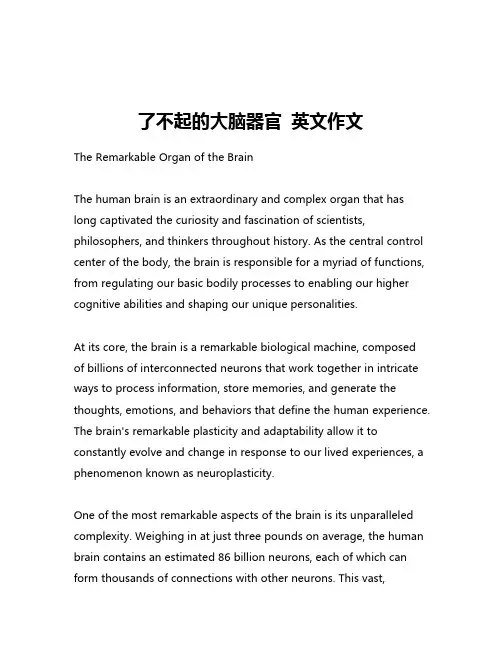
了不起的大脑器官英文作文The Remarkable Organ of the BrainThe human brain is an extraordinary and complex organ that has long captivated the curiosity and fascination of scientists, philosophers, and thinkers throughout history. As the central control center of the body, the brain is responsible for a myriad of functions, from regulating our basic bodily processes to enabling our higher cognitive abilities and shaping our unique personalities.At its core, the brain is a remarkable biological machine, composed of billions of interconnected neurons that work together in intricate ways to process information, store memories, and generate the thoughts, emotions, and behaviors that define the human experience. The brain's remarkable plasticity and adaptability allow it to constantly evolve and change in response to our lived experiences, a phenomenon known as neuroplasticity.One of the most remarkable aspects of the brain is its unparalleled complexity. Weighing in at just three pounds on average, the human brain contains an estimated 86 billion neurons, each of which can form thousands of connections with other neurons. This vast,interconnected network of cells gives rise to the brain's extraordinary computational power, enabling it to perform a dizzying array of tasks with seemingly effortless ease.The brain's primary regions, including the cerebrum, cerebellum, and brainstem, each play a crucial role in our overall functioning. The cerebrum, for instance, is responsible for higher-order cognitive functions, such as language, reasoning, and decision-making, while the cerebellum is primarily involved in coordinating movement and maintaining balance. The brainstem, on the other hand, regulates essential involuntary functions like breathing, heart rate, and sleep-wake cycles.Moreover, the brain's remarkable plasticity allows it to adapt and change in response to our experiences and environment. Throughout our lives, the brain is constantly rewiring its neural connections, a process known as neuroplasticity, which enables us to learn new skills, form new memories, and even recover from brain injuries or neurological disorders.One of the most fascinating aspects of the brain's plasticity is its ability to compensate for damage or dysfunction in certain regions. When one part of the brain is impaired, such as in the case of a stroke or traumatic brain injury, other areas of the brain can often take on new roles and responsibilities, allowing the individual toregain lost functions or develop new coping strategies.This remarkable adaptive capacity is also evident in the brain's remarkable resilience, as it is able to withstand a significant amount of damage and still maintain its core functions. The brain's intricate system of blood vessels, for instance, provides a redundant supply of oxygen and nutrients, ensuring that even if one area is deprived, the brain can still continue to function.Furthermore, the brain's remarkable complexity is mirrored in its incredible energy efficiency. Despite its relatively small size, the brain consumes a disproportionately large amount of the body's energy resources, accounting for approximately 20% of the body's total energy expenditure. This efficiency is largely due to the brain's highly specialized neural networks, which are able to communicate and process information with remarkable speed and precision.In recent years, advances in neuroimaging techniques, such as functional magnetic resonance imaging (fMRI) and positron emission tomography (PET), have provided unprecedented insights into the brain's inner workings, revealing the intricate patterns of neural activity that underlie our thoughts, emotions, and behaviors. These technologies have also helped researchers better understand the brain's role in various neurological and psychiatric disorders, paving the way for more targeted and effective treatments.Despite our growing understanding of the brain, however, many of its most fundamental mysteries remain elusive. How does the brain generate consciousness? How do we form memories and retrieve them? What is the neural basis of our emotions and personality? These questions and many others continue to captivate the curiosity of scientists and thinkers around the world, driving ongoing research and exploration into this remarkable organ.As we continue to unravel the secrets of the brain, it is clear that this remarkable organ is not only the foundation of our cognitive and emotional experiences, but also a testament to the incredible complexity and adaptability of the natural world. By continuing to study and understand the brain, we may unlock new insights that could greatly improve our lives and the lives of those affected by neurological and psychiatric disorders. The brain, truly, is an extraordinary and remarkable organ that deserves our ongoing fascination and scientific pursuit.。

关于大脑演讲稿的英语作文英文回答:The Brain.The brain is a complex and fascinating organ that plays a vital role in our daily lives. It is responsible for controlling our thoughts, emotions, and actions. It is also the center of our nervous system, which allows us to perceive and interact with the world around us.One of the most remarkable aspects of the brain is its ability to process information. It can take in vast amounts of sensory input, such as sights, sounds, and smells, and make sense of it all. This cognitive processing allows us to understand and interpret the world, and it forms the basis of our thoughts and actions.The brain is also responsible for our emotions. It processes and interprets the signals from our body and theenvironment to create feelings of joy, sadness, fear, and more. For example, when we see a loved one, our brain releases chemicals that make us feel happy and excited. On the other hand, when we encounter a dangerous situation, our brain triggers a fight or flight response, releasing adrenaline and preparing our body to react.Furthermore, the brain controls our actions and movements. It sends signals through the nervous system to our muscles, allowing us to walk, talk, and perform various tasks. It also coordinates complex movements, such as playing a musical instrument or driving a car. Without the brain's control, our bodies would be unable to function properly.In addition to these functions, the brain is capable of learning and adapting. It can form new connections between neurons, allowing us to acquire new skills and knowledge. For example, when we learn to ride a bike, our brain creates new pathways that enable us to balance and pedal. This ability to learn and change is known asneuroplasticity and is crucial for our personal growth anddevelopment.In conclusion, the brain is a remarkable organ that controls our thoughts, emotions, and actions. It processes information, generates emotions, and coordinates movements. It also has the ability to learn and adapt, allowing us to acquire new skills and knowledge. Understanding the brain's functions can help us appreciate its complexity and the importance of taking care of our mental health.中文回答:大脑。
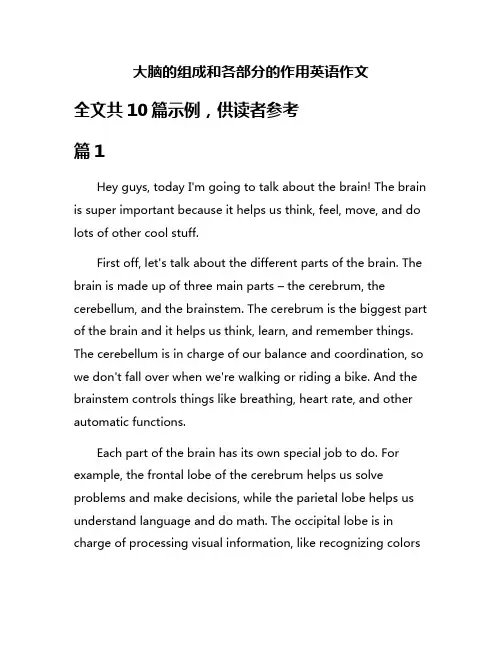
大脑的组成和各部分的作用英语作文全文共10篇示例,供读者参考篇1Hey guys, today I'm going to talk about the brain! The brain is super important because it helps us think, feel, move, and do lots of other cool stuff.First off, let's talk about the different parts of the brain. The brain is made up of three main parts – the cerebrum, the cerebellum, and the brainstem. The cerebrum is the biggest part of the brain and it helps us think, learn, and remember things. The cerebellum is in charge of our balance and coordination, so we don't fall over when we're walking or riding a bike. And the brainstem controls things like breathing, heart rate, and other automatic functions.Each part of the brain has its own special job to do. For example, the frontal lobe of the cerebrum helps us solve problems and make decisions, while the parietal lobe helps us understand language and do math. The occipital lobe is in charge of processing visual information, like recognizing colorsand shapes. And the temporal lobe helps us hear and understand sounds.It's really amazing how our brain can do so many things all at once! So make sure to take care of your brain by getting plenty of sleep, eating healthy foods, and staying active. Your brain will thank you for it!篇2The brain is like a super computer in our body. It helps us think, feel, move, and do all the things we need to do. But do you know how the brain is made up and what each part does? Let me tell you all about it!First, let's talk about the main parts of the brain. The brain is divided into three main parts: the cerebrum, the cerebellum, and the brain stem. Each part has its own special job to do.The cerebrum is the biggest part of the brain and is responsible for things like thinking, learning, and controlling our muscles. It also helps us see, hear, and feel things. The cerebellum is like the brain's little helper. It helps us move smoothly and keep our balance. Without it, we would be stumbling around all the time!The brain stem is the part of the brain that controls our basic functions like breathing, heartbeat, and digestion. It also helps us stay awake and alert. Without the brain stem, we wouldn't be able to do any of the things we do every day.Now, let's talk about some special parts of the brain. The hippocampus is the part of the brain that helps us form memories. Without it, we wouldn't be able to remember all the fun things we've done with our friends and family. The amygdala is the part of the brain that helps us feel emotions like fear and excitement. It's like our brain's little alarm system!So, as you can see, the brain is a very important part of our body. It helps us do all the things we need to do every day. So make sure to take care of your brain by eating healthy foods, getting plenty of sleep, and exercising regularly. Your brain will thank you for it!篇3The brain is like a super cool computer inside our heads and it helps us do all sorts of things like think, feel, move, and remember stuff. Isn't that awesome? But you know what's even cooler? The brain is made up of different parts that all have their own important jobs. Let's check them out!First up, we have the cerebrum. This is the biggest part of the brain and it's in charge of thinking, remembering, and feeling stuff. It helps us do all sorts of things like solving math problems, remembering our friends' names, and feeling happy when we see a cute puppy.Next, we have the cerebellum. This part of the brain helps us with balance and coordination. It's like our brain's own personal gym coach, making sure we can walk, run, jump, and dance without falling over. Thanks, cerebellum!Then, we have the brain stem. This part of the brain controls things like breathing, heartbeat, and digestion. It's basically the boss of all the important stuff that keeps us alive. So, thanks brain stem for working hard and keeping us healthy!Last but not least, we have the amygdala. This part of the brain is all about emotions. It helps us feel things like fear, anger, and happiness. So, the next time you feel scared during a scary movie, you can thank your amygdala for giving you all those intense feels.So, there you have it – the brain is made up of different parts, each with their own important jobs. Isn't that cool? Just remember to take care of your brain by eating healthy, getting enough sleep, and staying active. Your brain will thank you for it!篇4My Brain and How it WorksHey guys! Today I'm gonna talk about our brains and all the cool stuff they do. So, our brain is like a super important part of our body because it helps us do everything – like thinking, feeling, and moving.Our brain is made up of different parts, and each part has a special job to do. First, we have the cerebrum, which is the biggest part of our brain. It's in charge of thinking,problem-solving, and controlling our movements. It also helps us with our senses, like seeing, hearing, and smelling. How cool is that?Next, we have the cerebellum, which is at the back of our brain. This part helps us with balance and coordination. So, when we're walking, running, or riding a bike, we can thank our cerebellum for keeping us steady.Then, there's the brainstem, which controls our basic functions like breathing, heart rate, and digestion. It also helps us stay awake and alert. Without our brainstem, we wouldn't be able to do any of these things!Lastly, we have the hippocampus, which is in charge of our memory. It helps us remember things like what we had for breakfast or where we put our toys. So, if you ever forget something, just blame it on your hippocampus!Overall, our brain is super amazing and does so many things to help us every day. We should take care of our brains by eating healthy foods, getting enough sleep, and staying active. Let's all give a big shoutout to our brains for being awesome!篇5My brain is like the boss of my whole body, it controls everything I do! But do you know how my brain is made up and what each part does? Let me tell you all about it!First of all, my brain is divided into three main parts - the cerebrum, the cerebellum, and the brainstem. The cerebrum is the biggest part and it's like the supercomputer of my brain. It helps me think, learn, and make decisions. It also controls my senses like sight, touch, and taste.The cerebellum is like the coordinator of my brain. It helps me move smoothly and keep my balance. So when I ride my bike or play soccer, it's all thanks to my cerebellum!The brainstem is the smallest part but it's super important. It controls things like my heartbeat, breathing, and swallowing. Without it, I wouldn't be able to do all the things my body needs to do to stay alive.Inside my brain, there are also tiny cells called neurons. They send messages to each other using electricity and chemicals. This is how my brain tells the rest of my body what to do. It's like a big communication network inside my head!So there you have it, the big boss of my body - my brain! It's made up of different parts that all work together to help me do everything I need to do. I'm so glad I have such an amazing brain inside my head!篇6Hey guys, do you know what makes our brain tick? Let me tell you all about it!Our brain is like a super computer in our body, controlling everything we do. It is made up of three main parts: the cerebrum, cerebellum, and brainstem.The cerebrum is the biggest part of our brain and is responsible for thinking, learning, and feeling emotions. It alsocontrols our five senses: sight, hearing, taste, touch, and smell. So, when you see a cute puppy, hear your favorite song, or taste yummy ice cream, you can thank your cerebrum!Next up is the cerebellum, which is located at the back of our brain. This part helps us with balance, coordination, and muscle movement. So, when you ride a bike, dance, or play sports, your cerebellum is working hard to keep you steady and on track.Last but not least, we have the brainstem, which is found at the base of our brain. This part controls our basic functions like breathing, heart rate, and sleeping. It also helps us stay awake and alert during the day.So, there you have it — the three main parts of our brain and what they do. Pretty amazing, right? Our brain is truly a marvel of nature, and we should always take good care of it by eating healthy, getting enough sleep, and exercising regularly.Remember, our brain is like a muscle — the more we use it, the stronger it gets. So, keep learning, exploring, and experiencing new things. Your brain will thank you for it!篇7Hello everyone! Today I'm going to talk about the brain and its different parts. The brain is like the control center of our body, and it helps us think, feel, move, and do lots of other things.The brain is made up of many different parts, each with its own special job. The largest part of the brain is called the cerebrum, and it's where we do all of our thinking. It helps us learn new things, remember stuff, and solve problems. The cerebrum is also divided into two parts, called hemispheres, and each side controls different things. For example, the left side helps us with language and math, while the right side helps us with creativity and art.Another important part of the brain is the cerebellum, which is located at the back of the brain. The cerebellum helps us with balance, coordination, and movement. It's what helps us walk, run, and ride a bike without falling over.The brainstem is located at the base of the brain and connects the brain to the spinal cord. It helps control things like breathing, heart rate, and digestion. Without the brainstem, we wouldn't be able to do all of these important things that keep us alive.There are also many other parts of the brain, like the thalamus, hypothalamus, and hippocampus, that help us with things like sensing, emotions, and memory.So as you can see, the brain is a very important organ that helps us do all sorts of things. It's like a supercomputer inside our heads, working non-stop to make sure we can think, feel, and move. So let's all take care of our brains and keep them healthy by eating well, getting enough sleep, and staying active. Your brain will thank you for it!篇8The brain is like a super cool computer inside our heads, and it's made up of many different parts that work together to help us think, feel, and do stuff. Let's take a closer look at the different parts of the brain and what they do!First up, we've got the cerebrum, which is the biggest part of the brain. It's responsible for things like thinking, learning, and feeling emotions. It helps us do things like solve puzzles, remember stuff, and understand what we see and hear. The cerebrum is divided into two halves, called the left hemisphere and the right hemisphere. The left side helps us with things likelanguage and logic, while the right side is more creative and helps us with things like art and music.Next, we've got the cerebellum, which is kind of like the brain's own personal GPS. It helps us with balance, coordination, and muscle movement. So when you're riding a bike, dancing, or playing sports, you can thank your cerebellum for helping you stay on your feet!Then there's the brainstem, which is like the brain's control center. It helps us with things like breathing, heart rate, and digestion. It also helps us stay awake and alert. So when you're feeling sleepy in class, it's because your brainstem is telling you it's time for a nap!Last but not least, we've got the hippocampus, which is like the brain's librarian. It helps us with memory and learning new things. So when you're studying for a test or trying to remember a friend's birthday, you can thank your hippocampus for helping you keep it all straight!So there you have it – the brain is made up of lots of different parts, and they all work together to help us do all the awesome things we do every day. So next time you're thinking, feeling, or moving, remember to give your brain a big thank you for all its hard work!篇9Hey guys, do you know that our brain is like a super powerful computer in our body? It helps us think, feel, move, and do lots of other cool stuff! Let's talk about the different parts of our brain and what they do.First up, we have the cerebrum. This is the biggest part of our brain and it's responsible for things like thinking, learning, and controlling our muscles. It's split into two parts, called hemispheres, and each side controls the opposite side of our body. So when you use your right hand to write, it's thanks to the left side of your cerebrum!Next, we have the cerebellum, which is like our brain's personal trainer. It helps us balance, coordinate our movements, and make sure we don't fall over. So next time you're riding a bike or playing sports, give a shoutout to your cerebellum for keeping you steady!Then there's the brainstem, which is in charge of all the basic stuff our body needs to survive, like breathing, heartbeat, and digestion. It's like the captain of the ship, making sure everything runs smoothly so we can stay alive and kicking.Last but not least, we have the amygdala and hippocampus. The amygdala is our brain's alarm system, helping us feel emotions like fear and anger. The hippocampus, on the other hand, is like our brain's memory bank, storing all the cool stuff we learn and experience.So there you have it, guys! Our brain is made up of all these awesome parts, each with its own important job to do. So let's give a big shoutout to our brains for being such superstars! Keep learning, keep growing, and most importantly, keep having fun exploring the amazing world inside your head! Go, brainpower!篇10The brain is like a super cool computer in our head that helps us think, feel, move, and do all kinds of awesome stuff! It's made up of different parts, kind of like how a car has an engine, wheels, and seats.First, we have the cerebrum, which is the biggest part of the brain. It helps us with things like thinking, learning, and feeling emotions. It's like the boss of the brain, making all the big decisions.Next, we have the cerebellum, which is at the back of the brain. It helps us with balance and coordination. So when we'reriding a bike or playing sports, we can thank the cerebellum for keeping us steady.Then, there's the brainstem, which is like the brain's bodyguard. It controls things like breathing, heart rate, and sleeping. So even when we're snoozing, the brainstem is working hard to keep us alive.Last but not least, we have the hippocampus, which is super important for memory. It helps us remember things like where we put our toys or what we learned in school. Without the hippocampus, we'd forget everything!All these parts work together to make sure our brain is running smoothly. So next time you're thinking, feeling, or moving, remember to thank your brain for doing such an amazing job!。
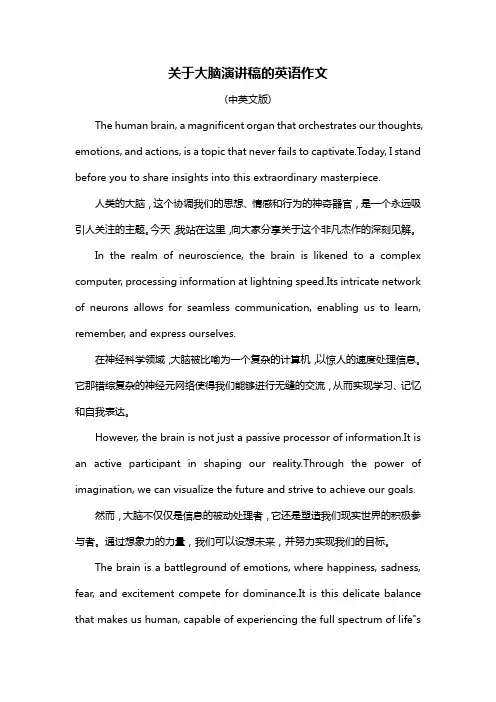
关于大脑演讲稿的英语作文(中英文版)The human brain, a magnificent organ that orchestrates our thoughts, emotions, and actions, is a topic that never fails to captivate.Today, I stand before you to share insights into this extraordinary masterpiece.人类的大脑,这个协调我们的思想、情感和行为的神奇器官,是一个永远吸引人关注的主题。
今天,我站在这里,向大家分享关于这个非凡杰作的深刻见解。
In the realm of neuroscience, the brain is likened to a complex computer, processing information at lightning speed.Its intricate network of neurons allows for seamless communication, enabling us to learn, remember, and express ourselves.在神经科学领域,大脑被比喻为一个复杂的计算机,以惊人的速度处理信息。
它那错综复杂的神经元网络使得我们能够进行无缝的交流,从而实现学习、记忆和自我表达。
However, the brain is not just a passive processor of information.It is an active participant in shaping our reality.Through the power of imagination, we can visualize the future and strive to achieve our goals.然而,大脑不仅仅是信息的被动处理者,它还是塑造我们现实世界的积极参与者。

介绍头脑的英文作文英文回答:The brain is the central organ of the nervous system, and is responsible for controlling most bodily functions, including thought, emotion, memory, and movement. It is located in the skull and protected by the meninges, aseries of membranes. The average brain weighs about three pounds and is made up of about 75 percent water.The brain is divided into two hemispheres, the left and right, which are connected by the corpus callosum. Each hemisphere is responsible for different functions: the left hemisphere is responsible for logic, language, and mathematics, while the right hemisphere is responsible for creativity, emotions, and music.The brain is made up of several different types of cells, including neurons, which transmit electrical signals, and glial cells, which support the neurons. Neurons arearranged in a complex network of connections, which allow them to communicate with each other and send and receive information.The brain is a highly complex organ, and scientists are still learning about how it works. However, research has shown that the brain is capable of amazing feats, including learning, memory, and creativity.中文回答:大脑是神经系统的中枢器官,负责控制大多数身体功能,包括思维、情绪、记忆和运动。
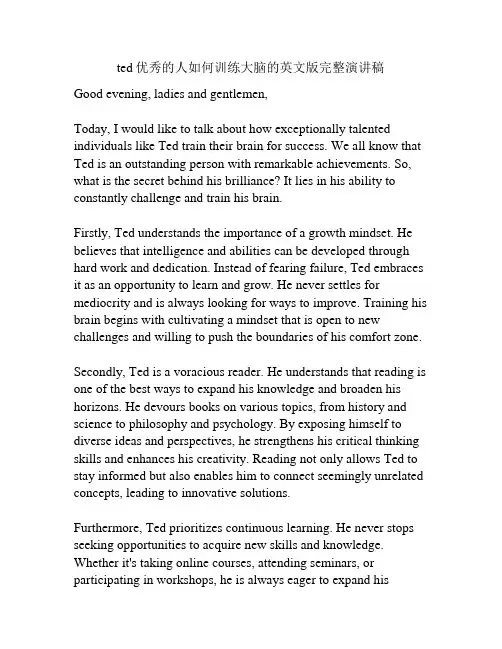
ted优秀的人如何训练大脑的英文版完整演讲稿Good evening, ladies and gentlemen,Today, I would like to talk about how exceptionally talented individuals like Ted train their brain for success. We all know that Ted is an outstanding person with remarkable achievements. So, what is the secret behind his brilliance? It lies in his ability to constantly challenge and train his brain.Firstly, Ted understands the importance of a growth mindset. He believes that intelligence and abilities can be developed through hard work and dedication. Instead of fearing failure, Ted embraces it as an opportunity to learn and grow. He never settles for mediocrity and is always looking for ways to improve. Training his brain begins with cultivating a mindset that is open to new challenges and willing to push the boundaries of his comfort zone.Secondly, Ted is a voracious reader. He understands that reading is one of the best ways to expand his knowledge and broaden his horizons. He devours books on various topics, from history and science to philosophy and psychology. By exposing himself to diverse ideas and perspectives, he strengthens his critical thinking skills and enhances his creativity. Reading not only allows Ted to stay informed but also enables him to connect seemingly unrelated concepts, leading to innovative solutions.Furthermore, Ted prioritizes continuous learning. He never stops seeking opportunities to acquire new skills and knowledge. Whether it's taking online courses, attending seminars, or participating in workshops, he is always eager to expand hisunderstanding and expertise. In doing so, Ted constantly challenges his brain, forcing it to adapt and develop new neural connections. This continuous learning cycle is crucial for his personal and professional growth.In addition, Ted is a firm believer in the power of practice. He knows that consistent and deliberate practice is the key to mastery. Whether it's honing his public speaking skills, refining his problem-solving abilities, or perfecting his leadership skills, Ted invests countless hours into deliberate practice. This involves breaking down complex tasks into smaller, manageable parts and repeating them with intense focus and attention to detail. Through this intensive practice, Ted's brain becomes wired for excellence.Lastly, Ted understands the value of rest and relaxation. While training his brain is essential, he also knows that allowing it to rest and recharge is equally important. He prioritizes sufficient sleep, engages in regular physical exercise, and incorporates mindfulness practices into his routine. These activities not only help Ted maintain his mental and physical well-being but also provide him with the necessary downtime for his brain to consolidate information and make creative connections.In conclusion, the brain is like a muscle that needs constant training and stimulation to reach its full potential. Ted's success can be attributed to his ability to cultivate a growth mindset, read extensively, prioritize continuous learning, engage in deliberate practice, and find a balance between training and rest. By following in Ted's footsteps, we too can unlock our brain's extraordinary potential and achieve greatness.Thank you.。
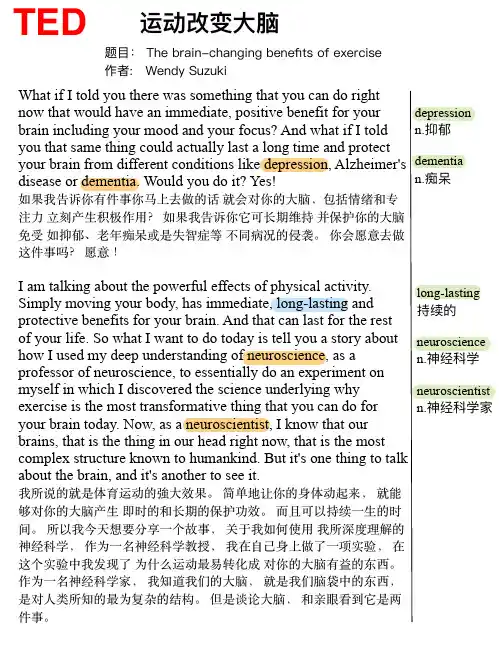
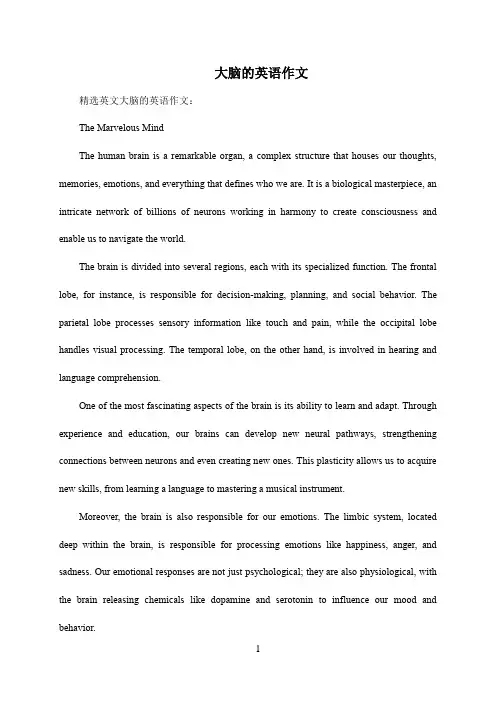
大脑的英语作文精选英文大脑的英语作文:The Marvelous MindThe human brain is a remarkable organ, a complex structure that houses our thoughts, memories, emotions, and everything that defines who we are. It is a biological masterpiece, an intricate network of billions of neurons working in harmony to create consciousness and enable us to navigate the world.The brain is divided into several regions, each with its specialized function. The frontal lobe, for instance, is responsible for decision-making, planning, and social behavior. The parietal lobe processes sensory information like touch and pain, while the occipital lobe handles visual processing. The temporal lobe, on the other hand, is involved in hearing and language comprehension.One of the most fascinating aspects of the brain is its ability to learn and adapt. Through experience and education, our brains can develop new neural pathways, strengthening connections between neurons and even creating new ones. This plasticity allows us to acquire new skills, from learning a language to mastering a musical instrument.Moreover, the brain is also responsible for our emotions. The limbic system, located deep within the brain, is responsible for processing emotions like happiness, anger, and sadness. Our emotional responses are not just psychological; they are also physiological, with the brain releasing chemicals like dopamine and serotonin to influence our mood and behavior.The brain's complexity is truly breathtaking. It is a universe of its own, a vast network of interconnected neurons, synapses, and glial cells, all working together to create the unique individual that we are. Despite the advances in neuroscience, there is still much we don't know about the brain. It remains a frontier of scientific exploration, a mysterious and fascinating organ that continues to inspire awe and wonder.中文对照翻译:奇妙的心灵人脑是一个非凡的器官,一个复杂的结构,容纳着我们的思想、记忆、情感以及定义我们是谁的一切。
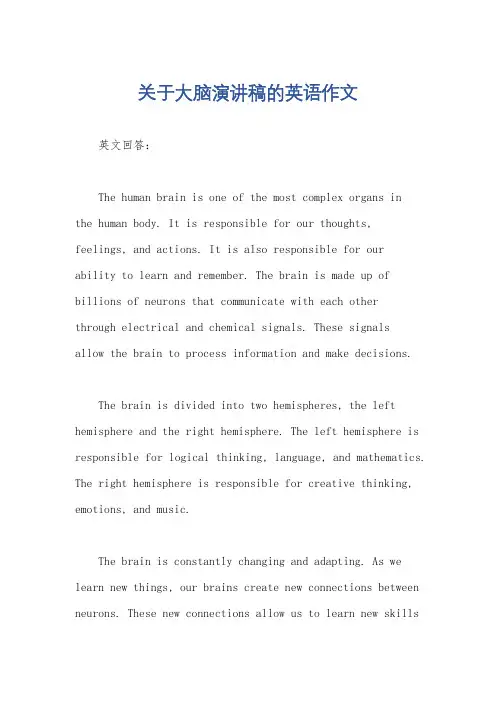
关于大脑演讲稿的英语作文英文回答:The human brain is one of the most complex organs inthe human body. It is responsible for our thoughts, feelings, and actions. It is also responsible for ourability to learn and remember. The brain is made up of billions of neurons that communicate with each otherthrough electrical and chemical signals. These signalsallow the brain to process information and make decisions.The brain is divided into two hemispheres, the left hemisphere and the right hemisphere. The left hemisphere is responsible for logical thinking, language, and mathematics. The right hemisphere is responsible for creative thinking, emotions, and music.The brain is constantly changing and adapting. As we learn new things, our brains create new connections between neurons. These new connections allow us to learn new skillsand remember new information. The brain is also capable of repairing itself. If a part of the brain is damaged, other parts of the brain can take over its functions.The brain is an amazing organ that is responsible for our ability to think, feel, and act. It is a complex organ that is still not fully understood, but scientists are constantly learning more about it.中文回答:大脑是人体中最复杂的一个器官之一。
对大脑的了解英语作文The Complexities of the Brain: A Journey into the Unknown.The brain, a three-pound organ nestled within the skull, is the command center of our existence. It is the seat of our consciousness, the origin of our thoughts, and thedriver of our actions. Despite its relatively small size,the brain is the most complex structure known in the universe, outstripping even the most sophisticated computer systems in terms of functionality and intricacy.The brain is composed of over 100 billion neurons, each connected to thousands of others through a vast network of synapses. These neurons communicate with each other via electrochemical signals, creating a web of communicationthat allows us to perceive the world, process information, and respond to it. The brain is divided into four main lobes: the frontal, parietal, temporal, and occipital, each responsible for different cognitive functions. The frontallobe, for instance, is associated with decision-making, planning, and social behavior, while the occipital lobe processes visual information.The brain's plasticity is one of its most remarkable features. This means that the brain has the ability to reorganize itself both structurally and functionally in response to changes in the environment or to injury. For instance, in the event of a stroke or other brain injury, undamaged areas of the brain can often take over functions previously performed by damaged areas, a phenomenon known as neuroplasticity.The brain is also home to our emotions and memories. The amygdala, a small structure deep within the brain, plays a crucial role in emotional processing, regulating our responses to both positive and negative stimuli. Memories, on the other hand, are stored in a distributed network of brain regions, with different types of memories being associated with specific areas. For instance, declarative memories, which are consciously recalled facts and events, are thought to be stored in the hippocampus andassociated cortical regions.The brain is also responsible for our conscious experience. Consciousness, a term that encompasses our awareness of self and the world, is thought to arise from the complex interactions of multiple brain regions, particularly the prefrontal cortex and other association areas. While the exact mechanism remains a mystery, research suggests that consciousness may emerge from the integration of information across widely distributed brain networks.In recent years, neuroscience has made significant strides in unraveling the mysteries of the brain. Technologies such as functional magnetic resonance imaging (fMRI) and positron emission tomography (PET) have allowed researchers to observe brain activity in real time, providing insights into how different regions interact to perform specific tasks. Studies have revealed that the brain is constantly adapting and learning, even into adulthood, with new neural connections being formed and old ones being pruned away as we acquire new skills andknowledge.Despite these advances, however, the brain remains a vast and largely unmapped territory. The complexity of its structure and function defies easy explanation, and eventhe most sophisticated technologies have yet to fullyreveal its secrets. The brain is a true frontier of science, one that continues to challenge and fascinate us in equal measure.In conclusion, the brain is a remarkable organ that underlies all aspects of our lives. It is the seat of our thoughts, emotions, and memories, and the driver of our actions. Its complexity and adaptability are breathtaking, and its potential for growth and learning is limitless. As we continue to explore the brain's mysteries, we gain a deeper understanding of ourselves and our place in the universe.。
人的大脑和身体能够承担什么的英语作文全文共6篇示例,供读者参考篇1The Amazing Power of Our Brain and BodyHello everyone! Today, I want to talk to you about something incredible - the power of our brain and body. Have you ever wondered what our brain and body can do? Well, get ready to be amazed!Our brain is like a supercomputer. It helps us think, learn, and remember things. It controls everything we do! Just think about it - how do we walk, talk, and even breathe? It's all thanks to our brain!One of the most amazing things about our brain is its ability to learn. It's like a sponge that can soak up knowledge. When we go to school and listen to our teachers, our brain absorbs all the information. That's how we learn new things every day! Whether it's math, science, or history, our brain can handle it all.But that's not all! Our brain is also responsible for our creativity. It helps us come up with new ideas and solve problems.Have you ever invented a new game or created a beautiful piece of art? That's your brain at work!Now, let's talk about our body. Our body is like a machine that can do incredible things. It allows us to run, jump, and play. Have you ever run in a race or climbed a tree? That's all thanks to your amazing body!Our body is made up of different parts that work together. We have muscles that help us move, bones that give us structure, and organs that keep us healthy. Can you believe that we have a heart that beats about 100,000 times every day? It's like a pumping machine that keeps us alive!Our body is also capable of amazing things like healing itself. When we get a cut or a bruise, our body knows how to fix it. It sends special cells to the injured area to repair it. Isn't that incredible?So, what can our brain and body handle? The answer is - almost anything! Our brain can handle learning new things, being creative, and solving problems. Our body can handle physical activities, healing itself, and staying healthy.But it's important to remember that our brain and body need our help too. We need to eat healthy food, exercise, andget plenty of rest. By taking care of our brain and body, we can unlock their full potential!In conclusion, our brain and body are truly amazing. They can handle so much - from learning new things to running and playing. Let's appreciate and take care of our brain and body because they are the most precious things we have!I hope you enjoyed learning about the incredible power of our brain and body. Keep exploring and discovering new things - the possibilities are endless!篇2The Amazing Things Our Brain and Body Can Do!Hello everyone! Today, I want to talk to you about something truly incredible – our brain and body! Did you know that our brain and body can do so many amazing things? It's like having superpowers! Let's explore what our brain and body can do together.First, let's talk about our brain. Our brain is like the boss of our body. It helps us think, learn, and remember things. Have you ever wondered how we can remember our favorite song lyrics or solve a math problem? That's all thanks to our brain!Our brain is divided into different parts, and each part has a special job. The frontal lobe helps us make decisions, the occipital lobe helps us see, the temporal lobe helps us hear, and the parietal lobe helps us feel things like touch. It's like having a team of superheroes in our head!Our brain also controls our senses. We can see beautiful colors, taste yummy food, smell fragrant flowers, hear music, and feel the softness of a pet's fur – all because of our brain! It's like having a superpower that lets us experience the world in so many amazing ways.Now, let's talk about our body. Our body is like a machine that helps us move, play, and explore the world around us. Have you ever wondered how we can jump, run, and dance? That's all thanks to our body!Our body has many incredible parts. Our muscles help us move and play sports. They make us strong and help us do things like climbing, swimming, and riding a bike. Our bones give our body structure and protect our organs. Without them, we would be like jelly!Our heart is another vital part of our body. It pumps blood and gives us energy to do all the fun things we love. It's like having a powerful engine that keeps us going! Our lungs help usbreathe and bring oxygen to our body. They are like two balloons that fill up with air and let us run and play for a long time.But that's not all! Our body can also heal itself. If we get a cut or a scrape, our body sends special cells to fix it. It's like having a team of doctors and nurses inside us, working hard to make us feel better.Our brain and body are truly remarkable. They allow us to learn, explore, and enjoy life to the fullest. But it's important to take care of them too. We need to eat healthy food, get plenty of sleep, and exercise regularly. Just like superheroes need to recharge, our brain and body need rest and nourishment to stay strong.So, my friends, let's celebrate our amazing brain and body! Let's use our superpowers to learn new things, be kind to others, and make the world a better place. Remember, you are capable of incredible things because of your brain and body. Keep exploring, keep learning, and keep being awesome!That's all for today. I hope you enjoyed learning about our brain and body. Until next time, stay curious and keep using your superpowers!Word count: 522 words篇3The Amazing Brain and BodyHi everyone! Today, I want to talk to you about our incredible brain and body. Did you know that they can do so many amazing things? Let's dive into the fascinating world of our brain and body!First, let's talk about our brain. Our brain is like a supercomputer that controls everything we do. It helps us think, learn, and remember things. Can you imagine what it would be like without a brain? We wouldn't be able to do anything!Our brain is divided into different parts, each with its own special job. The frontal lobe helps us make decisions and solve problems. The parietal lobe helps us understand and process information from our senses, like touch and taste. The occipital lobe helps us see, and the temporal lobe helps us hear and remember sounds.But did you know that our brain can also change and grow? It's true! When we learn new things, like reading or riding a bike, our brain creates new connections between its cells. This is called"neuroplasticity." So, the more we learn, the smarter our brain becomes!Now, let's move on to our amazing body. Our body is like a machine with many parts that work together. It's incredible how our body can do so many things without us even thinking about it! For example, when we breathe, our lungs take in oxygen and remove carbon dioxide. Our heart pumps blood to deliver oxygen and nutrients to all parts of our body.Our body is also made up of bones and muscles. Our bones give us a strong framework and protect our organs. They also help us move. Can you wiggle your fingers? That's because of the muscles in your hands and arms! Muscles help us run, jump, and play.But our body can do even more amazing things! It can heal itself when we get a cut or a scrape. Have you ever wondered how that happens? Well, our body has special cells called "white blood cells" that fight off germs and help us get better when we're sick.Our brain and body are connected. When we exercise or play sports, our brain releases chemicals called "endorphins" that make us feel happy and energized. That's why it's important to stay active and take care of our body.In conclusion, our brain and body are truly incredible! They work together to help us think, move, and experience the world around us. So, let's be grateful for our amazing brain and body and take good care of them. Remember to eat healthy, exercise, and keep learning new things. The more we take care of ourselves, the more our brain and body can do amazing things!I hope you enjoyed learning about our brain and body as much as I did! Keep exploring and never stop asking questions. Our brain and body are full of wonders waiting to be discovered.篇4当然可以!以下是一篇关于人的大脑和身体能够承担的事情的英语作文,采用小学生的语言风格,篇幅约为2000个字。
TED英语演讲:如何用你的大脑控制他人的手臂葛雷格?盖吉的当前要务,是要让人人都可以接触脑神经科学。
在这场有趣、又有点吓人的展示中,这位脑神经科学家兼资深TED讲者,用一台简单、便宜的自製工具来夺走其中一位听众的自由意志。
这不是障眼法,它确实发生了。
下面是小编为大家收集关于TED英语演讲:如何用你的大脑控制他人的手臂,欢迎借鉴参考。
演说题目:How to control someone else's arm with your brain演说者:Greg GageThe brain is an amazing and complex organ. And while many people are fascinated by the brain, they can't really tell you that much about the properties about how the brain works because we don't teach neuroscience in schools.大脑是个很神奇又复杂的器官。
尽管很多人都对大脑十分着迷,他们却讲不出太多关于大脑的特征,以及它是怎样工作的,因为学校没有神经科学的课。
And one of the reasons why is that the equipment is so complex and so expensive that it's really only done at major universities and large institutions. And so in order to be able to access the brain, you really need to dedicate your life and spend six and a half years as a graduate student just to become a neuroscientist to get access to these tools.其中一个原因就是相应的设备太复杂又太昂贵,这些研究只有在高等学府和大型研究机构才能进行。
关于大脑的简单英语作文Title: Exploring the Marvels of the Brain。
The brain, a complex organ nestled within our skulls, is the command center of the human body. Its intricate network of neurons, neurotransmitters, and regions governs everything from our thoughts and emotions to our bodily functions. In this essay, we will delve into thefascinating world of the brain, exploring its structure, functions, and remarkable capabilities.At its core, the brain is composed of billions of nerve cells called neurons. These neurons communicate with each other through electrical and chemical signals, forming intricate neural circuits. The brain can be divided into several regions, each with its own specialized functions. For example, the frontal lobe is responsible for decision-making and problem-solving, while the occipital lobe processes visual information.One of the brain's most remarkable abilities is neuroplasticity, the ability to adapt and reorganize itself in response to new experiences or injuries. This means that the brain can form new neural connections, strengthen existing ones, and even compensate for damaged areas. It is this remarkable plasticity that underlies learning, memory, and recovery from brain injuries.Speaking of memory, the brain's memory system is incredibly intricate. Memories are not stored in a single location but are distributed throughout various regions of the brain. The hippocampus, for example, plays a crucial role in forming new memories, while the amygdala is involved in the emotional aspects of memory. Memories can be short-term or long-term, and the process of consolidation helps stabilize memories for long-term storage.Furthermore, the brain is responsible for regulating our emotions and behaviors. The limbic system, often referred to as the emotional brain, includes structureslike the amygdala and the hypothalamus, which play keyroles in emotions, motivation, and stress responses. Disorders affecting these areas, such as depression and anxiety, can significantly impact a person's well-being.In addition to its cognitive and emotional functions, the brain also oversees our physical sensations and movements. The somatosensory cortex processes sensory information from the body, allowing us to perceive touch, temperature, and pain. Meanwhile, the motor cortex is involved in planning and executing voluntary movements, coordinating the actions of muscles throughout the body.Understanding the brain's complexities is crucial not only for advancing our knowledge of neuroscience but alsofor developing treatments for neurological disorders. Conditions such as Alzheimer's disease, Parkinson's disease, and epilepsy can profoundly affect a person's quality of life, highlighting the importance of ongoing research into brain function and dysfunction.In conclusion, the brain is a marvel of nature, withits intricate structure and unparalleled capabilities. Fromregulating our bodily functions to shaping our thoughts and emotions, the brain is the ultimate multitasker. As we continue to unlock its secrets, we gain valuable insights into what it means to be human.。
TED英语演讲:运动为大脑带来的益处TED英语演讲:运动为大脑带来的益处What if I told you there was something thatyou can do right now that would have an immediate, positive benefit for yourbrain including your mood and your focus? And what if I told you that samething could actually last a long time and protect your brain from differentconditions like depression, Alzheimer's disease or dementia. Would you do it?Yes!如果我告诉各位,有件你们现在就可以做的事,对你的大脑会立即产生正面的好处,包括你的心情和专注都会受惠,你会如何呢?如果我告诉各位,这事能持续很久的时间,并保护你的大脑免于不同的病症,比如忧郁、阿兹海默症,或失智症的侵扰,你会如何?你们愿意做这件事吗?愿意!I am talking about the powerful effects ofphysical activity. Simply moving your body, has immediate, long-lasting andprotective benefits for your brain. And that can last for the rest of yourlife. So what I want to do today is tell you a story about how I used my deepunderstanding of neuroscience, as a professor of neuroscience, to essentiallydo an experiment on myself in which I discovered the science underlying whyexercise is the most transformative thing that you can do for your brain today.我谈的是活动身体的强大效应。
TED英语演讲:运动为大脑带来的益处今天你能为大脑做出什么样的变革? 行使! 神经科学家Wendy Suzuki说。
获得灵感去健身房,因为铃木讨论如何锻炼提高你的心情和记忆的科学 - 并保护你的大脑免受神经退行性疾病,如阿尔茨海默氏症。
The brain-changing benefits of exercise演讲者:Wendy Suzuki 温迪铃木中英对照演讲稿What if I told you there was something thatyou can do right now that would have an immediate, positive benefit for yourbrain including your mood and your focus? And what if I told you that samething could actually last a long time and protect your brain from differentconditions like depression, Alzh eimer’s disease or dementia. Would you do it?Yes!如果我告诉各位,有件你们现在就可以做的事,对你的大脑会立即产生正面的好处,包括你的心情和专注都会受惠,你会如何呢?如果我告诉各位,这事能持续很久的时间,并保护你的大脑免于不同的病症,比如忧郁、阿兹海默症,或失智症的侵扰,你会如何?你们愿意做这件事吗?愿意!I am talking about the powerful effects ofphysical activity. Simply moving your body, has immediate, long-lasting andprotective benefits for your brain. And that can last for the rest of yourlife. So what I want to do today is tell you a story about how I used my deepunderstanding of neuroscience, as a professor of neuroscience, to essentiallydo an experiment on myself in which I discovered the science underlying whyexercise is the most transformative thing that you can do for your brain today.我谈的是活动身体的强大效应。